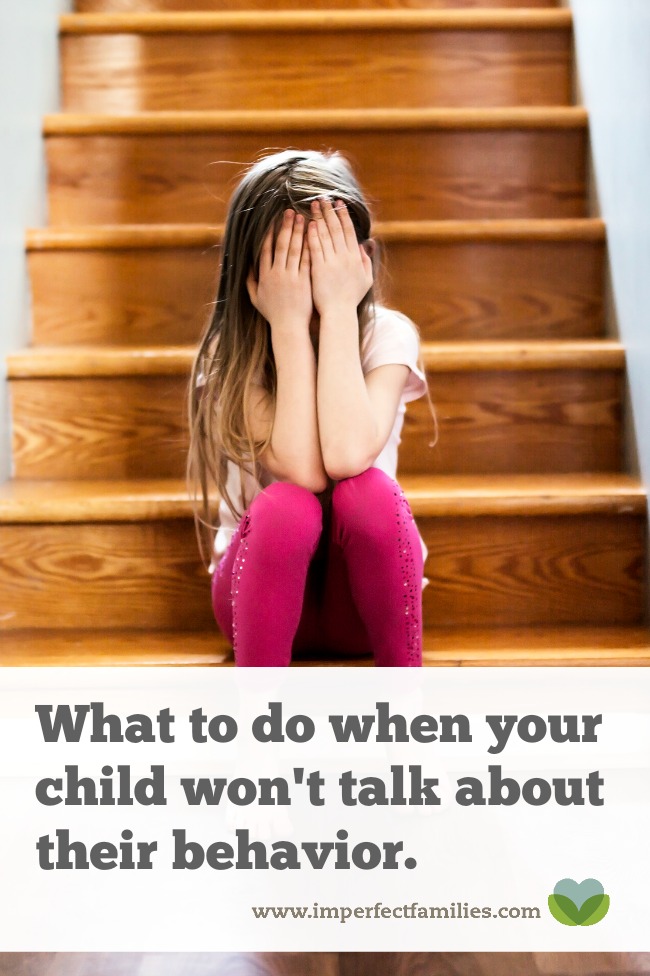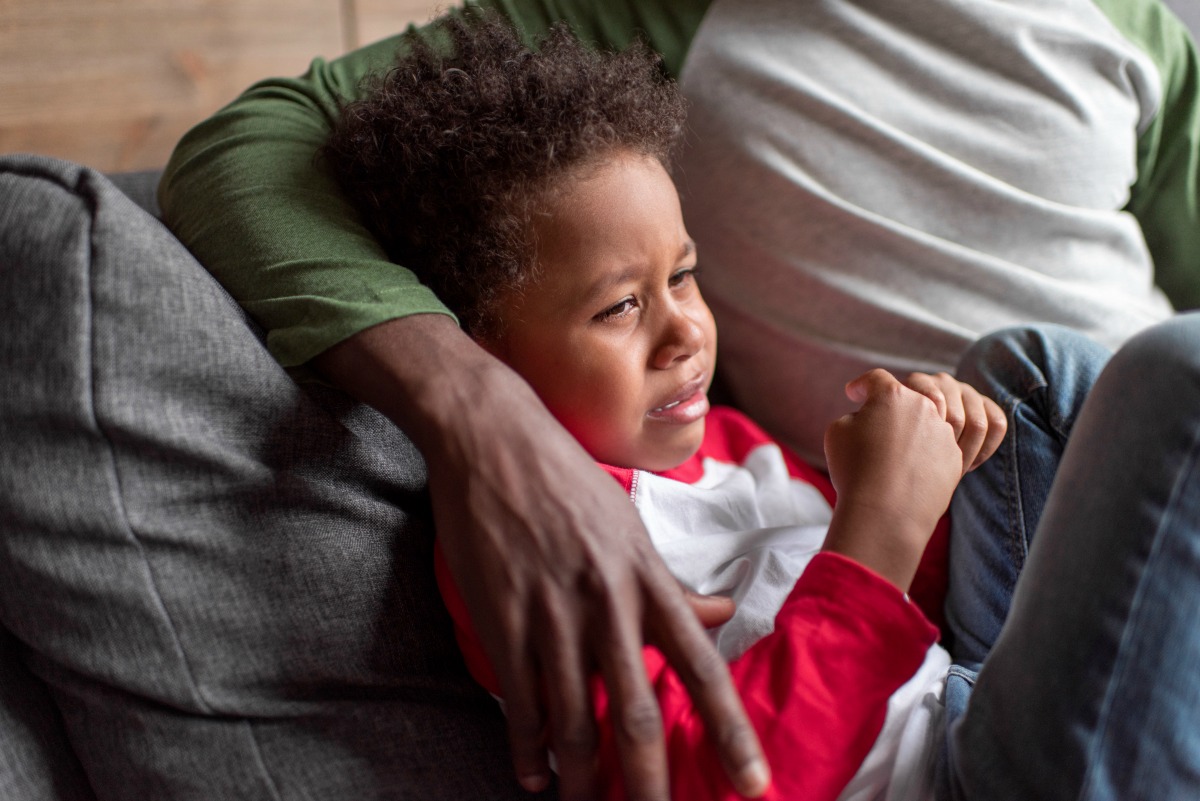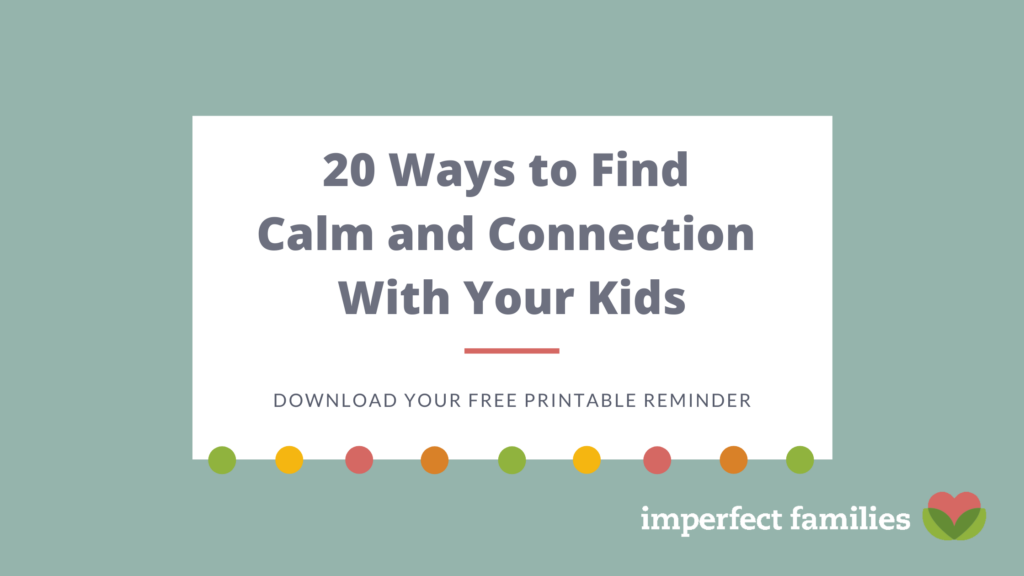You believe it’s important that your child admit their mistakes and own up to behavior that hurts others or is unacceptable. Unfortunately, when you try to talk to them, you get resistance – blame, avoidance, and “I don’t know.” Here are some tips to try when your child doesn’t want to talk about what they did wrong.

According to brain researchers, it’s ineffective to try to teach your kids a lesson in the heat of the moment. The “thinking” part of their brain is off-line, and the information you’re trying to instill will be ignored or forgotten immediately.
Instead, parents are told to wait until the child is calm to talk about challenges.
This is a great plan…in theory.
You: “We need to talk about how you treated your sister at lunch today.”
Your child: “You’re right, mom. I didn’t make a good choice.”
You: “What can you do next time?”
Your child: “I can ask you for help.”
Cue smiles and hugs.
Unfortunately, kids don’t always follow that script.
When kids don’t want to talk about their behavior
Many kids avoid talking about what they did wrong. Or, they don’t remember. Or, they’ve moved on to something else and are so absorbed they can’t be bothered to relive the past.
And then, you feel stuck. “You’re supposed to want to talk about it later! That’s what all the parenting books say will happen next!”
(If you can relate, you’re not alone!)
It’s normal for people to avoid things that are unpleasant or uncomfortable. It’s also normal for kids to live so much in the present that even a few minutes ago seems like a distant memory.
It doesn’t mean you’re doing anything wrong.
But, it might mean a few tweaks could make these conversations more productive. It might also be important to examine your expectations and see how they line up with what your child is capable of at their age and stage of development.
10 ways to encourage conversation
Unfortunately, there’s no one “perfect” script to follow when kids avoid these discussions. Instead, here are a few things to keep in mind when you run into resistance.
- Shame is Powerful – The message shame sends is that we’re not good enough, we’re not loveable, and vulnerability is scary and bad. Admitting fault is risky because you may not love them if they are imperfect. These messages often cause kids to blame others, resist taking responsibility, and to act like “everything’s fine.” Here are some tips on how to respond when shame impacts behavior.
- Pick your Battles – Not every infraction needs to be addressed specifically. If you’re constantly wanting to talk about behavior, your child is going to dread these conversations. Instead, clump like things together (sharing, sibling, chores, etc.), look for patterns, or address the “big things” and let the smaller things go. Here is more information about dealing with “non-negotiable” situations.
- Zoom Out – Things often seem really important in the moment, but stepping back puts them into context. Was your child exhausted? Hungry? Maybe the behavior doesn’t need to be addressed, instead, you just chalk it up to the fact that a basic needed to be met before they could make a better choice. Here are 25 things that can impact your child’s behavior.
- Dig for the Why – Resist the urge to blame, criticize, or come in as a “know it all” with all the solutions. Instead, get curious. Ask open-ended questions, learn what else was going on in the moment, explore what led up to the behavior, who was involved, etc. Wonder “why was this situation more difficult than others?” Here are some questions to explore together.
- Keep it Conversational – Nothing ends a conversation faster than a lecture. Remember to stop talking long enough for your child to get a word in. Be empathetic, asking yourself, “How would I want someone to talk to me about this?” Realize that they may need a minute or two to formulate a response. Here’s a lecture-alternative to try.
- Believe the “I don’t know” – Behavior doesn’t always make sense to kids. Sometimes they are just responding to an internal trigger, feeling overstimulated, or responding from a state of stress. The disconnect between thoughts, feelings, and behavior can be confusing. Rather than punishing this response, look for ways to encourage your child to tune into their body and communicate their feelings. These mindfulness strategies may be helpful.
- Use Everyday Events – Sometimes, it’s easier to process something when it happened to someone else. Look for books, TV shows, stories from when you were young, or hypothetical situations that talk about the lesson you’re trying to teach in a general way. Use these things to start a conversation, ask their opinion, or build on in it the future.
- Explore Other Methods – Don’t force your kids to talk face-to-face about difficult things (it’s hard for some people to make eye contact when they’re feeling ashamed about their behavior). Instead, encourage note writing, journaling, opportunities to talk in the dark at bedtime or while driving together in the car – which can all make it feel less vulnerable for your child to be honest.
- Rank the Results – For kids who struggle to talk about what happened, use the 1-5 scale (1 being “absolutely not” to 5 being “absolutely yes”) you can give some ideas of what might have happened or what they might have been thinking and they can put up 1 to 5 fingers to tell you how accurate you are and get a conversation started.
- Don’t force it – Yes, you want to address the behavior, especially if it’s becoming a pattern, but demanding an answer probably won’t get the answers you’re looking for. Take it slow. Give it time. Make it “safe” for your child to be honest with you by respecting their limits. Short conversations – even without solutions or resolution – may be a good place to start.
Remember, changing patterns takes time – If many of your “conversations” were actually lectures or yelling, your child may not feel safe talking to you about their behavior. If you’ve tended to criticize mistakes or make a big deal about accidents, they may avoid admitting shortcomings. Thankfully, changing the way you respond, can change how your kids respond. Unfortunately, it may take a while for your child to trust that your desire to talk about their behavior isn’t going to turn into a punishment. Be patient with yourself, and your child.
Related: “Communication For Imperfect Families” a self-guided e-course

A new parenting “script”
Ok, so your kids had an argument at lunch and it ended with your son grabbing your daughter’s sandwich and throwing it across the room.
You approach him later while he’s playing Legos.
You: “Lunch was hard today, huh?”
Him: “She started it! Are you going to yell at her too?”
You: “No one’s yelling, but I know little sisters can be annoying.”
Him: “Yeah, really annoying.”
You: “Was it something she said or something she did that bothered you?”
Him: Shrugging, “I don’t know.”
You: “I wonder if she made fun of you?”
Him: “I don’t remember.”
You: “OK. No problem.” (Deep breaths.) “Can you show me how upset you were at lunch with your Legos? Give me 1 Lego for ‘not really upset’ and 5 for ‘really upset.'”
Him: Silently pours a handful of Legos into your hand.
You: “Wow. That’s REALLY upset! I didn’t know! Thanks for telling me. Can you let me know next time you’re feeling THAT upset? I’d love to help you.”
Him: Shrugging again.
You take his non-verbals to signal the end of the conversation.
But you’re not worried. You can pick up the conversation from this point another time. You did your best to be empathetic and address the heart of the matter (his feelings at the moment). Plus, you have a visual (the Legos) to use in future conversations.
What if it still doesn’t work?
Even with our most patient and empathetic attempts, some children still struggle to admit or discuss their mistakes and behavior. In these situations, it may be beneficial to seek support from an outside source such as a Mental Health Professional, School Counselor, or Parent Coach.



Comments have been turned off to retain the privacy of all families. If you have a question or comment on the topic, you're always welcome to contact me.